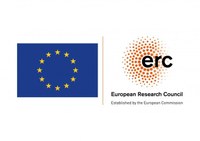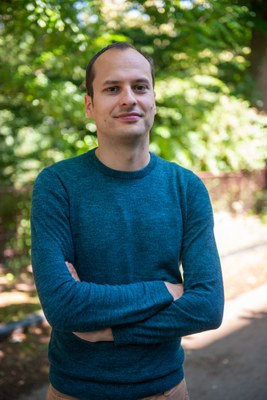News
Two prestigious ERC Starting grants for 2 researchers from the UNamur Transitions research institute

It's not often that two researchers from the same institution (and the same institute!) are awarded such prestigious funding...
These ERC Starting Grants for Jérémy Dodeigne's POLYSTYLE project and Vincent Jacquet's CITIZEN_IMPACT project will enable the emergence and development of a genuine centre of excellence in Political Science within the Transitions Institute at UNamur.
POLSTYLE - Jérémy Dodeigne
This project was funded by the European Research Council (ERC) as part of the European Union's Horizon Europe research and innovation programme (grant agreement no. 101078226). Find out more about Jérémy Dodeigne's POLSTYLE project
CITIZEN_IMPACT - Vincent Jacquet
This project was funded by the European Research Council (ERC) as part of the European Union's Horizon Europe research and innovation programme (grant agreement no. 101077920). Find out more about Vincent Jacquet's CITIZEN_IMPACT project
Congratulations to both of them!
New FNRS-qualified researcher at Transitions - Vincent JACQUET
 We are pleased to announce that Vincent Jacquet has been appointed F.R.S.-FNRS Qualified Researcher by the Board of Directors on 21 June 2022: https://www.frs-fnrs.be/docs/Resultats/FRS-FNRS_Candidatures_retenues_2022.pdf
We are pleased to announce that Vincent Jacquet has been appointed F.R.S.-FNRS Qualified Researcher by the Board of Directors on 21 June 2022: https://www.frs-fnrs.be/docs/Resultats/FRS-FNRS_Candidatures_retenues_2022.pdf
We would like to congratulate him on his excellent appointment! His research project, entitled 'Citizen impact', will certainly help to stimulate new research activities at the intersection of the Institute's three divisions: in a context of democratic 'crises', where democratic innovation reforms are multiplying (e.g. citizens' panels), he will analyse the impact of these citizens' panels on public action by governments, in terms of environmental and health policies. For more information on this project, see below.
**** "Citizen Impact" research objectives ****
Developing new channels of citizen participation and deliberation is a popular remedy to cure the malaise of contemporary representative regimes. Various elected officials, political observers and academics argue it could make our political system more legitimate, fair and efficient. This is not anymore a slogan. Citizens' assemblies (CAs) - forums where 'ordinary' citizens are randomly selected to deliberate on a particular issue and make policy recommendations - have been widely organised all around the world, most notably in European countries where we observe their steadily increase since 2010. Nevertheless, are such innovations living up to their ambitious goal of democratic renewal? On the opposite, are they mere 'window dressing' strategies used to deflect criticism? There is to date no satisfying answers to these questions. Despite many sophisticated studies focusing on conditions for CA internal success (e.g. representativeness of participants and quality of the exchanges), contemporary scholarship has left unexplored their more external impacts on the functioning of the political system.
In the next five years, I seek to assess whether, how and why CAs matter in contemporary European countries. For that purpose, I develop a research framework that connects the study of participatory and deliberative processes with several decades of research on policy analysis, governance and institutional transformations. This new approach considers CA impact as multidimensional and complex phenomenon. It suggests that to assess this impact, we should not only take into account (1) the direct translation of CA recommendations into policy decisions, but also how CAs indirectly (2) affect social and political groups capacity of action in the political systems and (3) shape the dominant discourse or narrative about the state of our democracy. To address these three dimensions, the research design combines different methods to compare macro national trends (frame analysis, survey with civil society organisations) and to disentangle complex processes (process tracing, interpretive analysis). Hence, the project opens a reflexive and critical horizon in the study of citizen participation and deliberation in political systems.
New CDR project for Jérémy Dodeigne
 The FNRS has just given the results of the 2020 "FRIA", "FRESH", "MIS", "CDR" and "PDR" calls. For the UNamur, 25 projects are being financed. Among these, Jérémy Dodeigne's IntraPartyComp CDR project (2021-2024).
The FNRS has just given the results of the 2020 "FRIA", "FRESH", "MIS", "CDR" and "PDR" calls. For the UNamur, 25 projects are being financed. Among these, Jérémy Dodeigne's IntraPartyComp CDR project (2021-2024).
In the last decades, electoral reforms have boosted importance of individual politicians in list proportional (PR) electoral systems. This general trend towards “personalization of politics” leads scholars to study its broad effects on intra-party competition and personal vote-seeking behaviour. Read more...
Prof. Jérémy Dodeigne is the principal investigator with the collaboration of Dr. Gert-Jan Put.
Laurent de Briey becomes Vice-dean of the Faculty of Economics, Social sciences and Business administration
 It is a 3-year mandate, from September 2020 to August 2023.
It is a 3-year mandate, from September 2020 to August 2023.
Laurent de Briey holds a PhD in philosophy and economics. He is a member of the Political, Social and Communication Sciences department, where he teaches economical and political philosophy. As an observer but also an actor in the political Belgian life (1), his expertise leans on a triangle formed by population, politics and experts, a trust link between population and the political world.
The Faculty of Economics, Social sciences and Business administration focuses on specific topics in which they excel. Please visit the website to discover more about financial market fluctuations, development economics, economic policy, information management, marketing of services, conflict management in politics, and company and individual web-identity.
(1) Laurent de Briey used to be head of cabinet of the former Education Minister Marie-Martine Schyns. Today, he leads a pilot participative project « Il fera beau demain – Mouvement positif ».
Christoph Niessen preselected by European Consortium for Political Research jury

Christoph Niessen ( F.R.S.-FNRS FRESH PhD student) was preselected by the jury of the European Consortium for Political Research for the « ECPR Rising Star Award ».
In its letter, the ECPR says: "Unfortunately he was not selected as the winner on this occasion but the ECPR judges were impressed with his achievements to date. That he was nominated and shortlisted is a wonderful achievement and the ECPR hopes he is very proud. The ECPR also very much looks forward to seeing him involved in ECPR activities in the future ».

